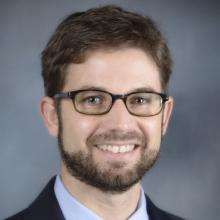In this webinar, "Shadow Pandemic: Mental Health Impacts of COVID-19 on Patients and the Care Team," experts share their experiences engaging pediatric and adult patients before and during the pandemic, and how patient health needs have changed over time.
Speakers also discuss the impacts on physicians and the care team to address patient mental and behavioral health needs. Hear the challenges encountered and solutions used to creatively address patient needs, and what is next for patient care.
Shadow Pandemic: Mental Health Impacts of COVID-19 on Patients and the Care Team
Webinar materials
- Webinar slides (PDF)
Speakers
Eileen Barrett, MD, MPH, SFHM, MACP
Internal Medicine Hospitalist, Eileen Barrett Physician Services, LLC
Eileen Barrett, MD, MPH, SFHM, MACP, is an internal medicine hospitalist, an American Medical Association-Satcher Health Leadership Institute Medical Justice in Advocacy fellow, regent emeritus of the American College of Physicians (ACP)vand multi-state district chair of the Society of Hospital Medicine (SHM). She is also chair of the American Medical Women’s Association (AMWA) Committee Advocacy Committee, a member-at-large on AMWA’s Governance Committee and is a member-elect of AMWA’s Board of Directors.
A former graduate medical education wellness initiatives director and director for continuing medical education at the University of New Mexico, Dr. Barrett’s research and scholarly work are in the areas of clinician well-being, gender equity, health equity and substance use disorders. She has received awards from the NM ACP Chapter in advocacy and for early-career leadership and was recognized by the NM SHM Chapter as the 2020 Physician of the Year. Dr Barrett received a 2019 Exceptional Mentor Award from the AMWA, is an elected member of the Gold Humanism Honor Society and received a 2021 Award of Excellence in Humanitarian Services from SHM.
Stephen O’Connor, PhD
Chief of the Suicide Prevention Research Program, National Institute of Mental Health (NIMH) Division of Services and Intervention Research
Stephen O’Connor, PhD, is chief of the Suicide Prevention Research Program in the National Institute of Mental Health (NIMH) Division of Services and Intervention Research. Dr. O'Connor manages a portfolio of grants that includes projects on youth and adult-related suicide risk detection and interventions to reduce suicide ideation, attempts and deaths. Prior to joining the NIMH, Dr. O'Connor conducted research focused on early intervention for suicide attempt survivors in trauma centers; group-based treatment for suicidal Veterans; a stepped, collaborative care approach to reduce posttraumatic stress, depression, substance use and suicide risk in hospitalized trauma patients; and other health services-oriented efforts to improve screening, assessment and treatment of suicidal individuals in both traditional and non-traditional behavioral health settings.
Dr. O’Connor completed his doctoral training in clinical psychology at the Catholic University of America, as well as a postdoctoral fellowship at the University of Washington Harborview Injury Prevention and Research Center.
Sala S. Webb, MD, FAPA, DFAACAP
Chief Medical Officer, OhioRISE
Sala S. Webb, MD, FAPA, DFAACAP, is the chief medical officer for OhioRISE—a new (primarily Medicaid) health plan for Ohio youth with significant behavioral health needs which goes live July 2022. She is excited to help design and implement this novel approach that will be uniquely tailored for this special population. Dr. Webb assumed a similar role when she was the chief medical officer of Behavioral Health for the Arizona's Department of Child Safety Comprehensive Health Plan. There, she ensured that youth in state out-of-home care received appropriate behavioral health services in coordination with physical health services. This was achieved through supporting caregivers and legal guardians, and interfacing with the other state child-serving agencies. In advance of that, she was the Children’s HealthCare administrator for one of the largest Medicaid Managed Care Organizations in Arizona. In that capacity, she oversaw the integrity of the physical and behavioral health services for the plan’s Medicaid recipients under 18 years of age.
Before relocating to Arizona, she was a psychiatric consultant to the United States Army Medical Department European Regional Medical Command in Bavaria, Germany.
Dr. Webb held a prior appointment as assistant professor of psychiatry at the Virginia Commonwealth University. There, she was the medical director of ambulatory services for the Virginia Treatment Center for Children; as well as a consultant to the Virginia Department of Juvenile Justice.
Dr. Webb enjoys working with special youth populations including those involved in foster care, those affected by sex trafficking and those with early-onset/first-episode psychosis. Other interests include global health, culture and diversity, and prevention efforts in mental health.
Originally from Trinidad and Tobago, Dr. Webb is board certified in both general and child & adolescent psychiatry and has served in many leadership capacities for the American Academy of Child and Adolescent Psychiatry, including on their national Diversity & Culture Committee and as secretary/treasurer of their assembly of regional organizations. Her most recent publication is as co-author of the Psychiatric Clinics of North America’s September 2020 article: "Achieving Mental Health Equity: Children and Adolescents" with T.B. Harris, S.C. Udeotuk, A. Tatem, L.M. Nutile and C.S. Al-Mateen.
Learn more
Explore the AMA STEPS Forward® Innovation Academy on-demand library of webinars on physician burnout, digital health, private practice, BHI and more.
988 Suicide & Crisis Lifeline
With an increased number of people reporting worsening mental health in recent years, it is imperative that people are aware of the 988 Suicide & Crisis Lifeline (formerly known as the National Suicide Prevention Lifeline) telephone program.
People experiencing a suicidal, substance use, and/or mental health crisis, or any other kind of emotional distress can call, chat or text 988, and speak to trained crisis counselors. The national hotline is available 24 hours a day, 7 days a week.
The previous National Suicide Prevention Lifeline phone number (1-800-273-8255) will continue to be operational and route calls to 988 indefinitely.
Disclaimer: The viewpoints expressed in this video are those of the participants and/or do not necessarily reflect the views and policies of the AMA.






